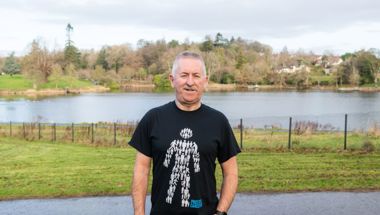Campaigns
12 Feb 2024Together with Tena Men, we’re tackling the taboo around incontinence
We've been campaigning with you, our incredible supporters, to break the taboo and raise awareness around male incontinence. You've helped us make waves with our Boys Need Bins campaign, but we're not stopping there.

The reality of urinary incontinence
Last Spring, it was announced that olaparib, a drug that kills prostate cancer cells with a particular genetic weakness, can now be given to eligible men across the UK.
Hundreds of men will now benefit from the drug, which has been shown to help men live several months longer on average.
Originally developed and approved to treat women with breast or ovarian cancer, olaparib can kill cancer cells that have faulty DNA repair systems caused by a mutation in their BRCA genes.
Thanks to your support, we were able to fund research that later found the treatment to be effective in prostate cancer, for men whose cancer also has these faulty repair mechanisms.
And now, following this research, men across the UK can receive treatment based on the genetic make-up of their prostate cancer.
Incontinence needs to be talked about and I think the reason why we can talk about it is because we’ve experienced it. Speaking freely has helped me personally.
Olaparib’s approval finally moves us away from a ‘one-size-fits-all' approach to prostate cancer and towards a future where every man gets a treatment tailored to him.
But not every man can benefit from olaparib – only some men have the right genetics.
So, to ensure that every man can benefit from this future, we need even more treatments that factor in each man’s unique biology.
That’s why, in the coming year, we’ll be funding even more research into the next generation of tests and treatments.
The projects will investigate all aspects of prostate cancer, from the underlying biology that drives it, to the weaknesses that could uncover new paths to treating it.
Last year, for example, we began funding Dr Jennifer Munkley at Newcastle University and Dr Benjamin Schumann at Imperial College London to zero in on sugar molecules found on the surface of prostate cancer cells that cause tumours to grow and spread.
Tackling the taboo: working with Tena Men
To give men the most benefit from these next-generation treatments, we’ll need to find ways to stop cancer becoming resistant to them.
Fortunately, in 2023 our researchers discovered how prostate cancer cells can harness the immune system to resist treatments – and a way to stop them.
Normally, the immune system is meant to defend the body against illnesses like cancer. However, in men with prostate cancer, the disease can send out ‘SOS signals’ to the immune system encouraging it to instead protect the cancer cells, making them resistant to treatments like chemotherapy.
By blocking this signal, the researchers massively reduced the interaction between men’s cancer cells and their immune cells.
This finding could lead to new, more effective ways to treat prostate cancer that the disease can’t easily become resistant to, and so save thousands of men’s lives.
However, this was a small-scale study with just 21 participants, so more research is needed to make sure that these results translate to men more broadly.





